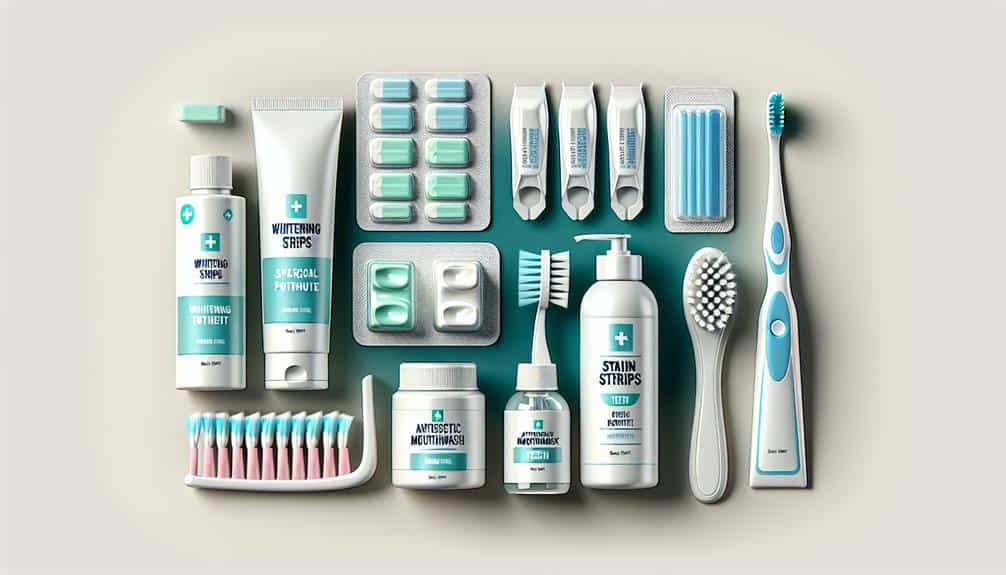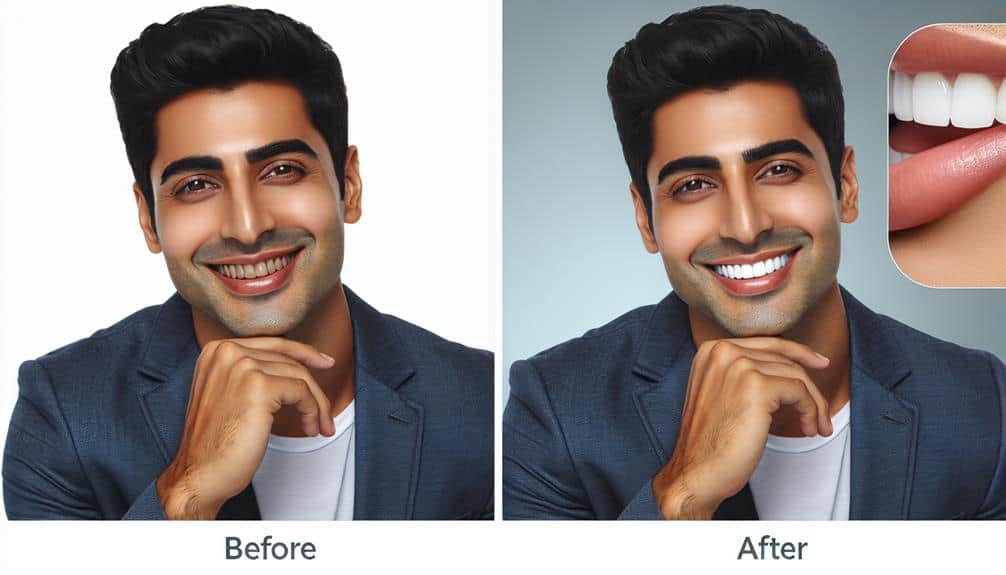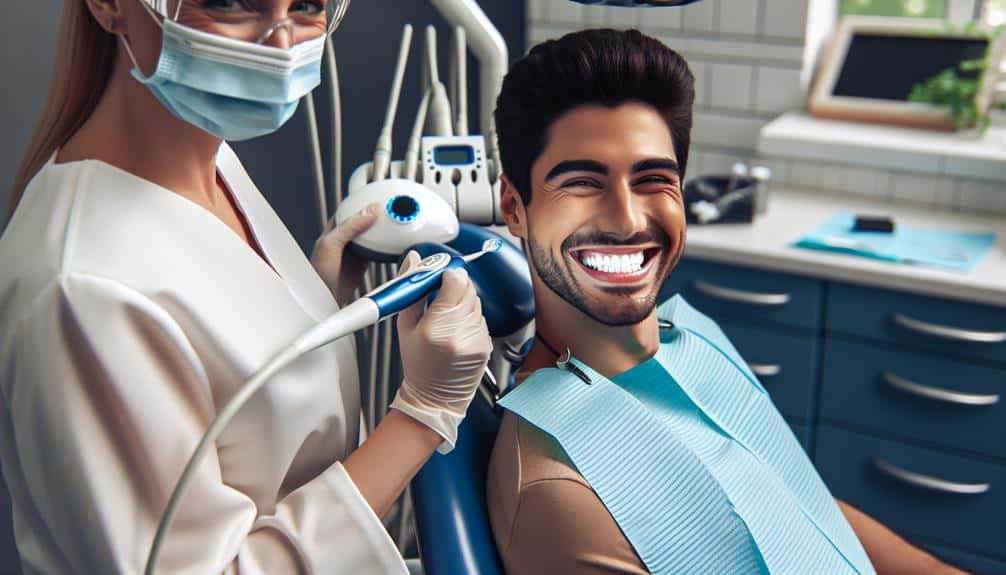To effectively tackle tough stains on your teeth, consider professional whitening treatments carried out by dental experts using high-concentration bleaching gels for noticeable results in one session. At-home whitening solutions are convenient with custom-fit trays and gentle whitening gels, while whitening toothpaste and mouthwash with stain-fighting ingredients aid in enamel protection.
Natural methods like oil pulling, baking soda, and hydrogen peroxide can help remove tough stains, and specialized solutions such as dental veneers offer long-lasting results. Consider a professional consultation for tailored treatments in cosmetic dentistry for significant whitening effects, ensuring you achieve a brighter smile.
Key Points
- Consider professional whitening treatments for effective removal of tough stains.
- Use at-home whitening solutions with enamel protection for convenience.
- Try whitening products like toothpaste and mouthwash for daily stain prevention.
- Explore natural methods like oil pulling and activated charcoal for stain removal.
- Consult with a dental professional for specialized solutions like dental veneers.
Professional In-Office Whitening Treatments
To achieve significant whitening results in a short amount of time, consider opting for professional in-office whitening treatments. In-office treatments are one of the most effective and cost-effective options for those seeking professional whitening with long-term results. Professional in-office whitening treatments are carried out by dental professionals who use high-concentration bleaching gels and specialized equipment to whiten your teeth efficiently.
These treatments typically involve a thorough dental check-up to make sure your teeth and gums are healthy before proceeding with the whitening process. The dentist will then apply the whitening gel to your teeth and activate it with a special light or laser to enhance the whitening effects. In-office treatments can provide noticeable results after just one session, making them an ideal choice for individuals looking to quickly improve the appearance of their teeth.
Furthermore, professional whitening treatments conducted in-office often yield longer-lasting results compared to at-home whitening kits. The expertise of the dental professionals and the use of high-quality products contribute to achieving a brighter and more radiant smile that can last for an extended period.
At-Home Whitening Kits
Consider utilizing at-home whitening kits as a convenient and cost-effective option for brightening your smile in the comfort of your own home. These kits typically contain whitening gel and custom-fit trays that mold to your teeth, guaranteeing even application of the whitening agent. When using at-home whitening kits, it's crucial to follow the instructions carefully to achieve best results.
DIY whitening methods such as baking soda or hydrogen peroxide should be used with caution as they can be abrasive and may cause damage to your enamel if not used correctly. At-home whitening kits, conversely, are formulated to be gentle on your teeth while effectively removing stains.
To ensure enamel protection during the whitening process, some at-home kits include desensitizing agents or remineralizing gels. These components help to strengthen enamel and reduce sensitivity that may occur during whitening treatments. Remember to consult with your dentist before starting any whitening regimen to confirm it's suitable for your dental health.
Whitening Toothpaste and Mouthwash
When looking to brighten your smile, whitening toothpaste and mouthwash can be effective tools.
Toothpaste designed for whitening can help remove surface stains, while mouthwash can provide additional benefits like freshening breath.
Look for products with stain-fighting ingredients like hydrogen peroxide or baking soda for best results.
Toothpaste for Whitening
Using whitening toothpaste and mouthwash can help combat tough stains on teeth effectively.
Whitening toothpaste often contains ingredients that aid in enamel protection and sensitivity prevention while offering fluoride benefits for overall dental health. These toothpaste formulas are designed to gently polish away surface stains, revealing a brighter smile.
Additionally, the inclusion of tartar control agents helps prevent the buildup of plaque, which can contribute to discoloration.
When used consistently as part of your oral hygiene routine, whitening toothpaste and mouthwash can gradually lighten stains and maintain the whiteness of your teeth.
Remember to follow the instructions provided by the manufacturer for the best results and consult your dentist for personalized recommendations based on your dental needs.
Benefits of Mouthwash
To enhance the effectiveness of whitening toothpaste in combating tough stains on teeth, incorporating a whitening mouthwash into your oral care routine can provide additional benefits for maintaining a brighter smile. Whitening mouthwashes help to remove surface stains and prevent new ones from forming, contributing to an overall improvement in the appearance of your teeth.
Additionally, using a mouthwash formulated for whitening can aid in freshening your breath and promoting excellent oral hygiene. The active ingredients in these mouthwashes can also help kill bacteria that cause plaque and gingivitis, supporting the health of your gums.
Stain-Fighting Ingredients
Incorporate stain-fighting ingredients like whitening toothpaste and mouthwash into your oral care routine to effectively combat tough stains on your teeth. Whitening toothpaste and mouthwash contain active ingredients that help break down and remove stains, revealing a brighter smile.
Here are some key stain-fighting components to look for in these products:
- Hydrogen Peroxide: This ingredient is known for its whitening properties, effectively targeting and lifting stubborn stains from the surface of your teeth.
- Baking Soda: A gentle abrasive, baking soda helps to scrub away stains without being too harsh on your enamel.
- Fluoride: Not only does fluoride strengthen your enamel, but it also helps prevent new stains from forming, maintaining your smile's brightness over time.
Incorporating these stain-fighting ingredients into your daily oral care routine can assist in combating tough stains and maintaining a healthy, radiant smile.
Oil Pulling
Consider harnessing the natural cleansing power of oil pulling to help combat tough stains on your teeth. This traditional remedy, now adapted to modern methods, offers significant oral hygiene benefits.
Oil pulling involves swishing a tablespoon of oil (such as coconut or sesame oil) around in your mouth for about 15-20 minutes. The oil acts as a natural cleanser, pulling out bacteria, debris, and toxins from your teeth and gums. This process not only helps remove stains but also promotes overall oral health by reducing harmful bacteria in the mouth.
Regular oil pulling can aid in reducing plaque buildup, preventing cavities, and freshening breath. The oil also helps moisturize the gums, potentially reducing inflammation and promoting healthier gums. While oil pulling may not provide instant results, consistent practice can lead to gradual improvements in the brightness of your teeth and the health of your mouth.
Incorporating oil pulling into your oral care routine can be a gentle yet effective way to combat tough stains and maintain oral hygiene.
Baking Soda and Hydrogen Peroxide
Utilize the powerful combination of baking soda and hydrogen peroxide to effectively tackle tough stains on your teeth. When used together, baking soda benefits from its mild abrasive properties, gently scrubbing away surface stains, while peroxide power helps to whiten teeth by breaking down deeper stains.
Here are some DIY teeth whitening techniques and the results achieved:
- Baking Soda Paste: Create a paste by mixing baking soda with a small amount of hydrogen peroxide to form a thick consistency. Gently brush this paste onto your teeth, focusing on the stained areas. Leave it on for a couple of minutes before rinsing thoroughly. This method can help remove stubborn stains and brighten your smile.
- Hydrogen Peroxide Rinse: Dilute hydrogen peroxide with water (make sure it's no more than 3% concentration) and swish it around in your mouth for about a minute. Spit it out and rinse your mouth with plain water. This rinse can help whiten teeth and kill bacteria that cause plaque and bad breath.
- Regular Usage: Consistent use of this baking soda and hydrogen peroxide combination can lead to noticeable improvements in the color of your teeth over time, providing a cost-effective and convenient way to maintain a brighter smile.
Activated Charcoal Products
Activated charcoal products have gained popularity for their purported ability to eliminate stains and toxins from various surfaces, including teeth. Charcoal toothpaste, a common product in this category, is believed to have whitening properties due to its abrasive nature, which can help scrub away surface stains on teeth.
One of the main activated charcoal benefits is its ability to adsorb substances, meaning it binds to toxins and chemicals, aiding in their removal. When used in oral care products, activated charcoal can attract and remove impurities, contributing to a cleaner and brighter smile.
It is important to note that while charcoal toothpaste and other activated charcoal products can be effective in removing surface stains, they may not address underlying issues causing discoloration. Additionally, using charcoal products too frequently can potentially wear down tooth enamel due to their abrasive nature. Hence, it's advisable to use these products in moderation and consult with a dental professional to make sure they're suitable for your oral health needs.
Fruit Enzymes and Whitening Gels
When it comes to brightening your smile, fruit enzymes offer a natural way to combat tough stains on teeth. These enzymes work by breaking down surface stains, revealing a whiter, brighter smile underneath.
Additionally, whitening gels can further enhance the whitening process, providing you with a smile that shines.
Enzymes for Brightening
Enhance the brightness of your smile using the power of fruit enzymes and whitening gels. Enzyme technology offers exceptional brightening benefits for your teeth. Here's how it works:
- Fruit Enzymes: Derived from fruits like pineapple and papaya, these enzymes help break down stains on the surface of your teeth, revealing a brighter smile.
- Whitening Gels: These gels contain powerful enzymes that penetrate the enamel, targeting deep-seated stains and discoloration for a more radiant smile.
- Enhanced Brightness: By incorporating fruit enzymes and whitening gels into your oral care routine, you can achieve a noticeably brighter smile and boost your confidence.
Whitening Gel Benefits
Experience the transformative benefits of whitening gels infused with powerful fruit enzymes for a brighter, more radiant smile.
Whitening gels are a popular choice for effectively removing tough stains on teeth while being gentle on your enamel. The fruit enzymes in these gels work to break down stains, revealing a whiter smile without causing harm to your enamel.
Additionally, these gels can promote better gum health by targeting bacteria that may lead to issues like gum disease. By using whitening gels regularly, you not only achieve a brighter smile but also safeguard the protection of your enamel and the overall health of your gums.
Incorporating whitening gels into your oral care routine can lead to a confident smile that mirrors good dental hygiene practices.
Dental Veneers for Severe Stains
Consider dental veneers as a viable solution for removing severe stains on your teeth. Dental veneers are thin, custom-made shells designed to cover the front surface of your teeth to improve their appearance.
Here are some key points to help you understand the benefits of dental veneers for severe stains:
- Custom Fit: Veneers are customized to fit your teeth perfectly, ensuring a natural look and feel.
- Stain Resistance: Veneers are resistant to stains, providing a long-lasting solution for severe discoloration.
- Durability: With proper care, dental veneers can last for many years, offering a reliable solution for persistent stains.
When considering veneers, it's crucial to weigh the options against veneer alternatives and be aware of the potential long-term effects. Consulting with a dental professional can help you determine if dental veneers are the right choice for addressing severe stains on your teeth.
Natural Remedies Like Turmeric Paste
To explore natural remedies like turmeric paste for addressing tough stains on teeth, you can discover a gentle yet effective alternative to traditional methods. Turmeric, known for its various health benefits, can also help whiten teeth due to its natural bleaching properties. Creating a DIY turmeric paste is simple: mix turmeric powder with water to form a paste, then apply it to your teeth, leaving it on for a few minutes before rinsing. The antibacterial and anti-inflammatory properties of turmeric can also promote gum health while combating stains.
Holistic approaches like using turmeric paste can be a sustainable and affordable way to address teeth discoloration. Unlike harsh chemicals in some commercial whitening products, turmeric offers a natural alternative that's gentle on enamel. However, utilizing turmeric paste in moderation is crucial to avoid potential yellow staining on teeth.
Incorporating natural alternatives into your oral care routine can complement professional treatments, offering a more holistic approach to maintaining a bright and healthy smile.
Professional Consultation for Persistent Stains
For persistent stains on your teeth that resist natural remedies, seeking a professional consultation is advised to assess the root cause and explore effective treatment options. When you visit a dental professional for persistent stains, they'll employ advanced technology to diagnose the nature and extent of the discoloration. Through this assessment, they can determine the most suitable method to address your specific staining concerns. Cosmetic dentistry offers various advanced treatments tailored to remove tough stains and enhance the overall appearance of your teeth.
Some common procedures used in cosmetic dentistry for persistent stains include:
- Professional Teeth Whitening: This procedure involves the application of professional-grade whitening agents that can significantly lighten stubborn stains.
- Dental Veneers: Thin shells custom-made to cover the front surface of teeth, hiding stains and improving the teeth' aesthetics.
- Composite Bonding: A tooth-colored resin is applied to the teeth and hardened with a special light, effectively covering stains and improving the smile's appearance.
Frequently Asked Questions
Are There Any Specific Foods or Drinks That Should Be Avoided to Prevent Tough Stains on Teeth?
Avoid highly pigmented foods and drinks like coffee, tea, red wine, and berries to prevent tough stains on teeth. Focus on maintaining good dietary habits and hygiene practices to preserve your smile's brightness and health.
Can Smoking or Tobacco Use Contribute to Tough Stains on Teeth?
Smoking or tobacco use can indeed contribute to tough stains on your teeth. Maintaining excellent oral hygiene and regular dental care can help prevent and combat these stains, ensuring a brighter, healthier smile.
Is It Safe to Use DIY Whitening Methods Like Lemon Juice or Apple Cider Vinegar?
You should avoid using DIY whitening methods like lemon juice or apple cider vinegar to remove tough stains on teeth. These natural alternatives can be harsh and may cause damage. Professional options are safer and more effective.
How Often Should Teeth Whitening Treatments Be Done to Maintain Results?
To maintain results, follow professional advice on the frequency of teeth whitening treatments. Consistent care is key in preserving your brighter smile. Consult with your dentist for personalized recommendations to guarantee lasting effects.
What Are the Potential Risks or Side Effects of Using Whitening Products on Teeth?
When using whitening products, consult a dental professional to discuss potential risks. Overuse can lead to sensitivity and enamel damage. Seek guidance to prevent issues and guarantee proper treatment for a brighter smile.
Conclusion
To sum up, when it comes to removing tough stains on teeth, there are various effective options available ranging from professional treatments to natural remedies.
Don't let stubborn stains dull your smile – take action and restore your pearly whites to their former glory.
Remember, a bright smile is like a beacon of light in a dark room, guiding others towards your radiant personality.
So, go ahead and shine bright with confidence!



